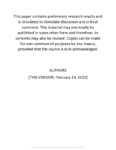| dc.description.abstract | The diffusion of biodigester technology can
contribute support towards the achievement of the global
goals brokered under the auspices of the United Nations. They have been promoted among farmers but low
adoption remains a challenge. Meanwhile, since biodigesters come in different technical designs, they have
corresponding performance attributes. While theory suggests that potential adopters trade off these attributes,
information about these tradeoffs is currently unavailable. Developing an understanding of how a potential
adopter trades-off these attributes can reveal important information which technology developers and information providers should consider when promoting
the technology.
After presenting the underlying random utility framework, a choice experiment (CE) was designed. Six attributes in the CE describing the technology included
its installation cost, reliability, durability, maintenance
cost, movability, and ease of defect identification. Based
on the modified Fedorov algorithm, an efficient design
was constructed. This resulted in 64 hypothetical alternatives in total, split into 2 blocks and presented as
a series of 8 choice tasks per respondent. Each choice situation had an opt-out alternative and three generic
choice profiles.
A random sample of 455 coffee farmers from Kiambu and Machakos provided data used in the analysis.
Estimation was implemented through application of a
mixed logit model. Results suggested that respondents
were willing to forego a cost of 8,400KES for easy defect identification. This suggests the desirability of coupling individual biodigester units with IoT-based sensor
instrumentation. This can enhance the continued functioning of biodigesters and stimulate the adoption of the
technology leading to reductions in on-farm methane
emissions. | en_US |

